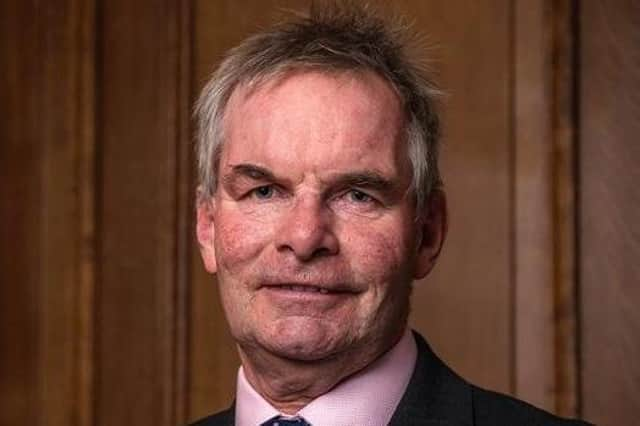Lincolnshire council leader ‘surprised’ at being missed out in Levelling Up plan


Levelling Up Secretary Michael Gove unveiled the 400-page strategy today which sets out how the government will improve services such as education, broadband and transport by 2030.
For instance, it says that by 2030, every part of England that wishes to have a ‘London-style’ devolution deal will have one.
Advertisement
Hide AdAdvertisement
Hide AdLincolnshire, however, is not mentioned in the first round of talks on this, with invites instead going to Cornwall, Derbyshire & Derby, Devon, Plymouth and Torbay, Durham, Hull & East Yorkshire, Leicestershire, Norfolk, Nottinghamshire & Nottingham, and Suffolk.
Lincolnshire County Council leader Coun Martin Hill said: “I’m surprised that Lincolnshire has not been included, especially after the Secretary of State used Lincolnshire as the backdrop for the launch of the white paper [when he visited Cleethorpes]!
“Lincolnshire is strategically important to many of the government’s priorities, including for the environment, and we feel our plans already meet the objectives set out in the white paper.
“Delaying levelling up for Lincolnshire will hold back the government’s ambitions as well as the improvements we need for residents and businesses.”
Advertisement
Hide AdAdvertisement
Hide AdHe said the councils had added “a lot more detail” to their “ambitious” plan since being initially invited to start expressing an interest two years ago.
He said councils across Greater Lincolnshire now had a 10-point plan, and were vying to be the 10th council to secure a county devolution deal.
“Lincolnshire has huge potential and this is a chance to address historical underfunding of our area.
“Our plan is designed to create thousands of new high-wage, high-skill jobs, revolutionise road, rail and digital infrastructure and transform towns to create a new future where living standards rise further.”
Advertisement
Hide AdAdvertisement
Hide AdHe said it was promising that the government recognised local leaders and decision-makers were best placed to control and target funding for their areas.
“To make a success of levelling up in the north, including the Humber Freeport, the government really needs to agree a devolution deal for Lincolnshire.
“Delays to our devolution deal will delay the government fulfilling their own aspirations, so we are urgently seeking discussions with Ministers to progress this as soon as we can.”
Lincoln MP Karl McCartney recently predicted that Greater Lincolnshire could become a unitary authority “very soon”, with a central mayor and a group of elected “super councillors”.
Advertisement
Hide AdAdvertisement
Hide Ad“I’m saying wake up and smell the coffee Lincolnshire, we’re going to have a mayor,” he told reporters.
Lincolnshire County Council and South Kesteven District Council rejected a settlement on offer from the government in 2016 declining to have a mayor.
Businesses say “devil in the detail”
Business leaders in the county have also expressed disappointment about the lack of devolution for Lincolnshire, but said there are some “very positive prospects” among the government’s missions.
Katrina Pierce, the Federation of Small Business’ development manager for Lincolnshire said: “From town centre regeneration to local public transport reform, small businesses in our area would benefit from serious focus on how our local environment looks, feels and works.
Advertisement
Hide AdAdvertisement
Hide Ad“However, as with all of these big, broad flagship agendas, the devil will be in the detail, or perhaps in the delivery.
“Small businesses must be part of the delivery process of these improvements, so smaller contractors, house builders and health and wellbeing therapists, for example, need to be able to bring their transformative skills to give life to these plans.”
Education boost for the county
There was some good news from the paper, however, as it was revealed Lincolnshire will become one of 55 new Education Investment Areas with aims to improve education for disadvantaged children and young people across England.
It means the county will receive “targeted support” including priority for new specialist sixth form free schools, eligibility for retention payments to help schools maintain the best teachers in high priority subjects, and access to a new pilot programme to improve pupil attendance.
Advertisement
Hide AdAdvertisement
Hide AdThe government wants to ensure 90% of children leaving primary school in England are reaching the expected standard in reading, writing, and maths by 2030.
Boston and Skegness MP Matt Warman responded to the news, saying: “No child or young person should be limited by where they grow up – they should be supported to get a world class education and the skills they need to succeed at school and beyond.
“I welcome the extra support Lincolnshire is receiving from this Conservative government, including funding to help schools retain the best teachers and priority for new specialist sixth form free schools to give talented children from disadvantaged backgrounds the highest standard of education.”
All district councils in Lincolnshire have been approached for a comment.